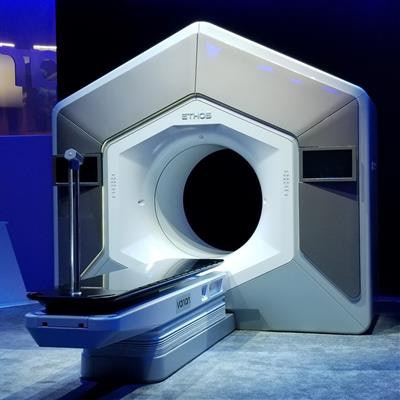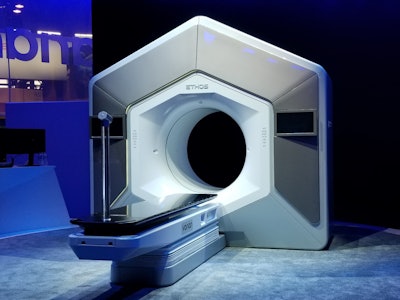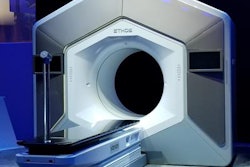
What if you could harness the power of artificial intelligence (AI) to guide radiation therapy treatments that adapt in real-time to changes in tumors? Varian Medical Systems is trying just that with its new Ethos system, launching at this week's American Society for Radiation Oncology (ASTRO) meeting in Chicago.
Ethos is an entirely new radiation therapy platform that's designed to provide highly customized treatments to individuals with cancer, a practice called adaptive radiotherapy. It's also the first Varian system to rely on AI to guide treatment, according to Chris Toth, president of Varian Oncology Systems.
The challenge of radiation therapy has always been to deliver radiation that most effectively targets malignant tumors while sparing healthy tissue. Various advances over the years have moved the discipline toward this goal, such as intensity-modulated radiation therapy (IMRT) and image-guided radiation therapy (IGRT).
 Varian's Ethos radiation therapy platform.
Varian's Ethos radiation therapy platform.But both technologies are typically planned in advance before the patient gets on the radiation therapy couch. What if changes have occurred in tumor size and shape between when the treatment was planned and when it's been executed?
Such on-the-fly adjustments to radiation treatments are radiation oncology's holy grail, according to Toth. But in the past, it took hours or even days to carry out the planning necessary to personalize treatments with adaptive therapy, he said.
In designing Ethos, Varian sought to make possible the delivery of adaptive radiation therapy within the standard 15-minute treatment window -- and without extensive planning.
Ethos includes an onboard conebeam CT (CBCT) scanner that acquires high-resolution images in about 17 seconds before treatment begins. The system's artificial intelligence algorithm then compares the CBCT scans to reference images from other modalities that were acquired during treatment planning using a deformable image registration technique.
If the target tumor has shifted between when the onboard scans and the planning images were acquired, Ethos' AI algorithm is able to make modifications to the treatment plan while the patient is still on the couch. After a quick quality assurance check, the modified treatment is delivered -- without delaying the treatment session. If there is no change, the session continues as planned.
"This is transformational in achieving the problem we are trying to solve," Toth said. "This solves a process that used to take hours and does it all on the couch in 15 minutes."
The first patient -- an individual with bladder cancer -- was treated with Ethos on September 9 at Herlev Hospital in Denmark. Users of the system were so pleased with its workflow that they immediately began planning other treatments, he said.
The company received the CE Mark for Ethos in the first week of September, and Varian is in the process of filing for a 510(k) application with the U.S. Food and Drug Administration. Commercial shipments will begin as soon as the system is cleared. Users of Varian's Halcyon system will be able to upgrade to Ethos.


















